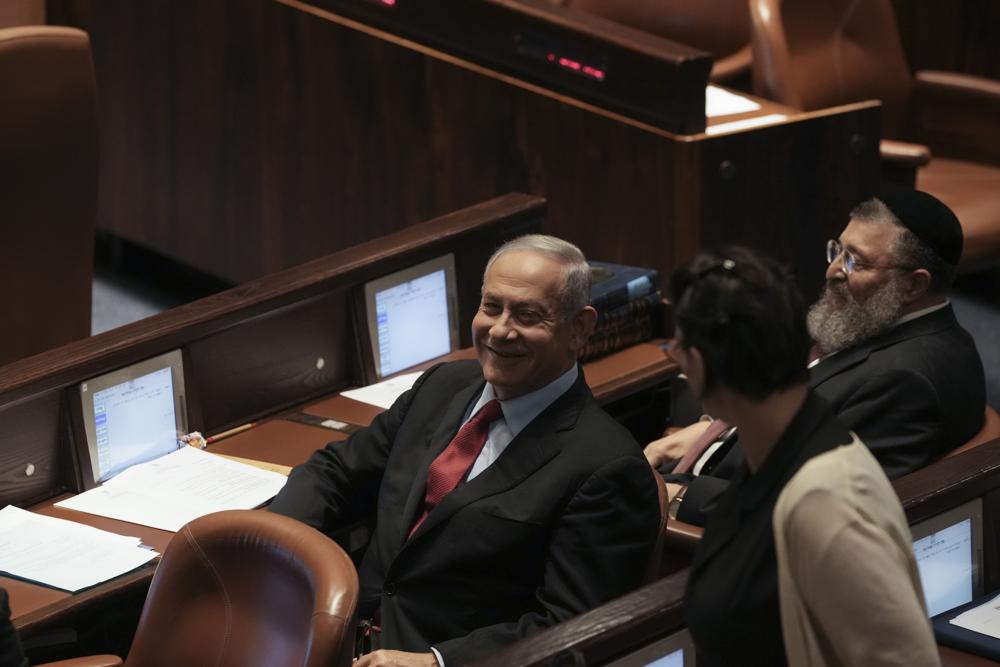After barely 12 months in office, the leaders of Israel’s broad-based but severely weakened coalition government threw in the towel this week, saying they would dissolve parliament and hold new elections — the fifth in 3 1/2 years.
Why does this keep happening?
The simplest answer is that Israel is deeply — and almost evenly — divided over whether Benjamin Netanyahu should be prime minister. But it’s also because Israel’s political system consists of an ideologically diverse array of parties that have to form alliances — and sometimes break them — to get what they want.
Here’s a look at how Israel reached this point and what comes next.
MULTI-PARTY POLITICS
Israelis vote by party, and in the country’s 74-year history no single faction has won a majority in the 120-member parliament, known as the Knesset. So after every election, any would-be prime minister must form alliances in order to cobble together a majority of at least 61 seats.
That gives small parties outsized power. After nearly every election, attention focuses on one or more potential kingmakers and their particular demands. Thirteen parties were elected to parliament, for instance, in last year’s election. This can result in weeks of negotiations and horse-trading among various party leaders.
If no one can assemble a majority, as happened after elections in April and September 2019, the country goes back to the polls and the government remains in place as a caretaker.
Still, it shouldn’t be this hard. Nationalist and religious parties captured a majority of seats in the Knesset in each of the last four elections, if only they could agree with one another.
That’s where Netanyahu comes in.
LOVE HIM OR HATE HIM
To his right-wing and religious supporters, Netanyahu is the “King of Israel” — an unapologetic nationalist and veteran statesman who can go toe-to-toe with world leaders, from Russia’s Vladimir Putin to U.S. President Joe Biden, shepherding Israel through its myriad security challenges.
To his opponents — including the leaders of the outgoing coalition — he is at best a crook and at worst a threat to democracy. They point to his ongoing corruption trial, his domineering style and his habit of stoking internal divisions for political gain.
Netanyahu was Israel’s longest-serving prime minister, and his Likud party came in first or a narrow second in all four elections. But he was never able to form a right-wing majority because some of his ideological allies — including former aides — refuse to partner with him.
Take Avigdor Lieberman, for example. The West Bank settler who heads a right-wing party and was long known for his fiery anti-Arab rhetoric would seem an obvious ally. But he broke with Netanyahu in 2019 and refuses to sit in a government with him or his ultra-Orthodox allies.
Lieberman even champions a bill that would bar anyone indicted on criminal charges from serving as prime minister — an attempt to end Netanyahu’s political career.
AN UNWIELDY COALITION
Last year, after election No. 4, Netanyahu’s opponents succeeded in ousting him.
Naftali Bennett — another right-wing former Netanyahu ally — and centrist Yair Lapid cobbled together a coalition of eight political parties from across the ideological spectrum — from right-wing nationalists to advocates of Palestinian statehood, including a small Arab Islamist party.
The factions set aside their ideological differences and worked together, for a time. The government passed a budget, weathered two coronavirus waves without imposing a lockdown, improved diplomatic ties with Arab and Muslim countries, and avoided war. Bennett, as prime minister, even tried his hand at mediating between Russia and Ukraine.
But from the beginning, the government had the slimmest of majorities, and Netanyahu marshalled enormous pressure against its right-wing members, accusing them of partnering with terrorists and betraying their voters. Several right-wing members of the coalition received death threats, including Bennett.
In the end, many buckled, and Bennett’s Yamina party all but collapsed. The government lost its majority in April. This month, it failed to pass a law extending special legal status to Jewish settlers in the occupied West Bank, which most Israelis view as essential.
NEW ELECTION, SAME DIVIDE
Israelis are now expected to return to the polls as soon as October, where they will wearily confront a familiar choice.
Netanyahu is hoping for a comeback, and the Likud and its allies are expected to win more votes than they did the last time around. Some of his right-wing opponents, weakened by their association with the coalition, could lose some or all of their seats.
But it’s far too early for any reliable polling, and even if Netanyahu and his allies secure more seats, they could fall short of a majority yet again.
If that happens, it would be left to many of the same parties that formed the outgoing government to cobble together a new coalition, one that would face the same stressors as the last one.
And if neither side has enough support to form a government?
You guessed it: New elections.
(AP)












3 Responses
1. A parliamentary system usually has frequent elections unless one party has a clear majority, and having proportional representation is a way to guarantee that no party will ever have a clear majority.
2. Eretz Yisrael has always been highly polarized in modern times (Jews vs Palestinians, Hareidim vs Religious Zionists vs Secularists, Capitalists and Socialists, Hawks vs Doves, etc.). In a “first past the post” or a system requiring a majority to get elected, groups have an incentive to compromise and build coalitions, but with proportional representation groups have an incentive to appeal to their base and ignore the rest.
3. Remember that proportional representation protects minorities, especially unpopular ones such as Hareidim and Palestinians. In a system requiring a majority to get elected, Hareidim and Palestinians would only be elected from districts in which they are a majority, and would largely be ignored in forming a coalition.
With or without Bibi Israel must now establish a real RIGHT WING government that looks after its people’s security and upholds what is written in the Torah.
Why cant Bibi support his party from the position of a Cabinet or Knesset Member rather than Prime Minister? If he had only put his ego aside, Israel would have had a strong government three years ago. Mishna Avos 4,28 : Rabbi Elazar HaKappar said: Jealousy, lust and the [pursuit of] honor remove a person from the world. And in this case, cause much suffering to many many people.
Bennett, a wealthy man, spent a large chunk of taxpayers money (read poor people), to renovate his mansion, not to mention to feed his family grandly while the nation he headed saw children go hungry and abused, all while taxing disposable cups and the ultra-orthodox communities. Bennett turned his neighborhood into a nightmare just because he refused to move his own family to the residence that was just fine for the Netanyahus. Bennett knowingly sacrificed his neighbors for his children, a no-no for politicians , and sold his voters confidence to the enemy for his own personal glory. He took credit for other peoples accomplishments and threatened his own parties politicians in favor or the enemy. Shaked, Lieberman, Lapid and Saar are all accessory to these crimes as well as a host of others too great for the scope of a reply.
Ganz is the only one who opposed and stayed true to his principals.